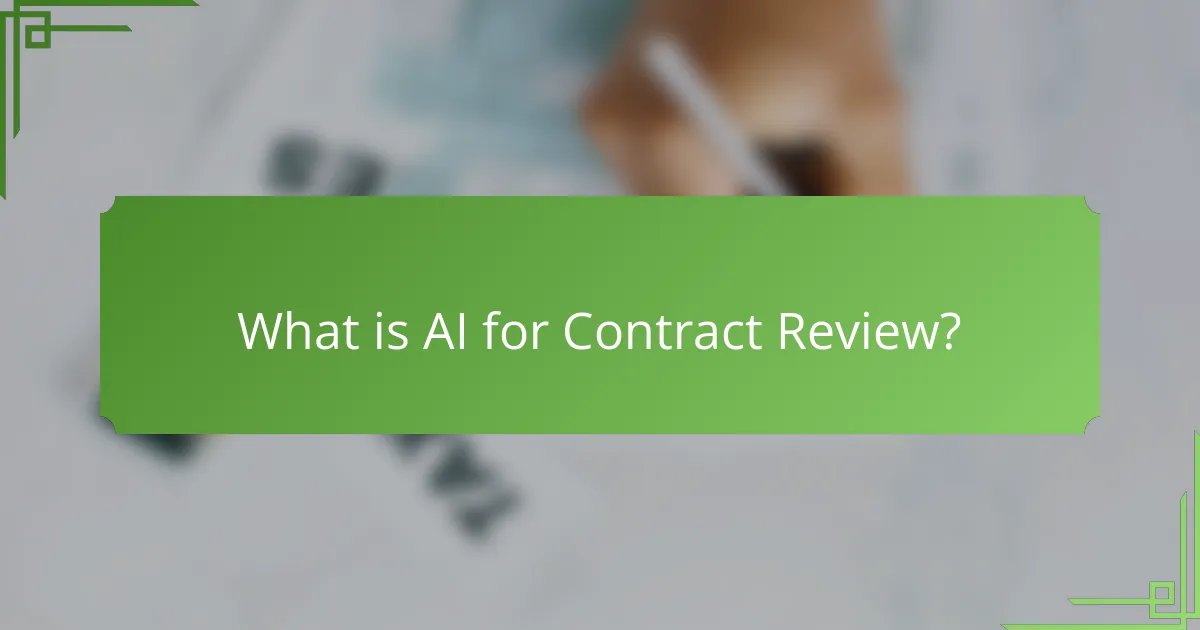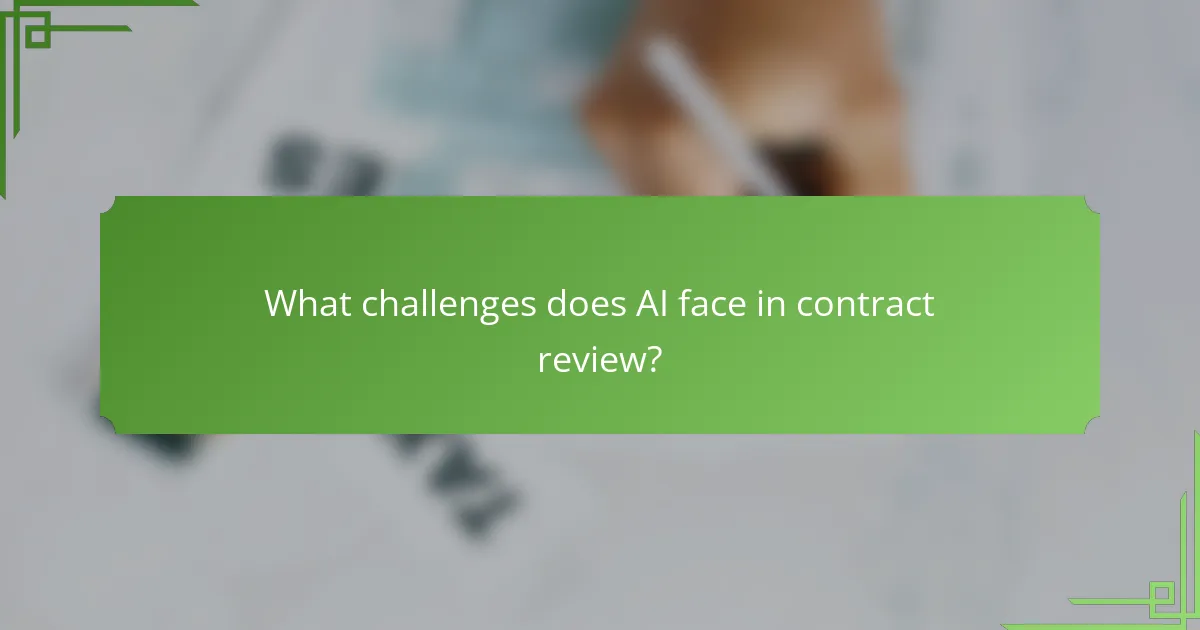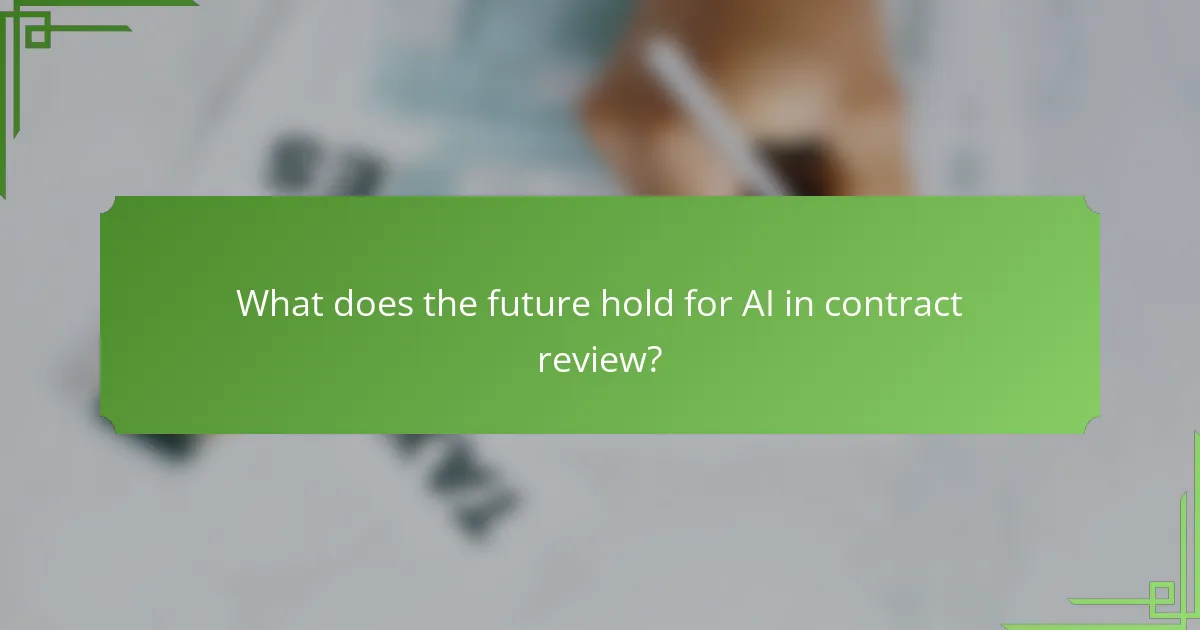
What is AI for Contract Review?
AI for Contract Review is a technology that uses artificial intelligence to analyze and assess legal contracts. It automates the review process, identifying key terms, clauses, and potential risks. This technology enhances speed and accuracy compared to manual reviews. AI tools can quickly process large volumes of documents, reducing the time needed for contract evaluation. They also minimize human error by ensuring consistent analysis. Many organizations adopt AI for Contract Review to improve efficiency and mitigate risks in legal agreements. The use of AI in this context is supported by advancements in natural language processing and machine learning.
How does AI enhance the contract review process?
AI enhances the contract review process by automating the analysis of contract terms and conditions. It increases speed by quickly scanning and processing large volumes of documents. AI algorithms can identify key clauses, discrepancies, and potential risks more efficiently than manual review. This technology improves accuracy by minimizing human errors and ensuring consistent evaluations. According to a study by Deloitte, AI can reduce contract review time by up to 70%. Additionally, AI can flag unusual terms that may pose risks, allowing for proactive risk mitigation. This capability supports legal teams in making informed decisions based on comprehensive data analysis.
What technologies are used in AI for contract review?
Natural Language Processing (NLP) is a primary technology used in AI for contract review. NLP enables machines to understand and interpret human language. Machine learning algorithms analyze contract language for patterns and anomalies. Optical Character Recognition (OCR) converts scanned documents into machine-readable text. This allows AI systems to process physical contracts. Rule-based systems automate the extraction of key clauses and terms. These technologies enhance speed and accuracy in contract analysis. AI tools can identify risks and compliance issues effectively.
How do AI algorithms analyze contract language?
AI algorithms analyze contract language by utilizing natural language processing (NLP) techniques. These algorithms break down the text into manageable components. They identify key terms, clauses, and conditions within contracts. Machine learning models are trained on large datasets of legal documents. This training allows the algorithms to recognize patterns and context in language. They assess compliance with regulations and identify potential risks. AI tools can also flag ambiguous language and suggest revisions. Studies show that AI can significantly reduce review time and improve accuracy in contract analysis.
What are the key benefits of using AI for contract review?
AI for contract review enhances speed, accuracy, and risk mitigation. It automates the analysis of contracts, significantly reducing the time required for review. Traditional contract review processes can take days or weeks. AI can complete similar tasks in minutes. This efficiency allows legal teams to focus on higher-value tasks.
Moreover, AI improves accuracy by minimizing human errors. It uses advanced algorithms to identify discrepancies and risks in contract language. Studies show that AI can achieve over 90% accuracy in contract analysis. This level of precision helps prevent costly legal issues.
Additionally, AI tools can analyze large volumes of contracts simultaneously. This capability provides insights that may be overlooked in manual reviews. As a result, organizations can make informed decisions faster. AI’s ability to learn from past reviews enhances its effectiveness over time.
How does AI improve speed in contract review?
AI improves speed in contract review by automating the analysis process. It can quickly scan and interpret large volumes of text. Traditional manual reviews take hours or days, while AI can complete similar tasks in minutes. AI algorithms identify key clauses and potential issues efficiently. This reduces the time spent on repetitive tasks. Studies show that AI can increase review speed by up to 80%. By streamlining workflows, AI allows legal teams to focus on more complex tasks. The combination of speed and efficiency enhances overall productivity in contract management.
In what ways does AI enhance accuracy during contract analysis?
AI enhances accuracy during contract analysis by automating data extraction and error detection. It uses natural language processing to identify key terms and clauses. This reduces human error and increases consistency in contract interpretation. AI tools can analyze large volumes of contracts quickly and accurately. Studies show that AI can achieve over 90% accuracy in identifying critical contract elements. Additionally, AI can flag inconsistencies and potential risks in real-time. This proactive approach allows for timely corrections and informed decision-making. Overall, AI significantly improves the precision of contract analysis processes.
How does AI help in risk mitigation for contracts?
AI helps in risk mitigation for contracts by automating the review process. It analyzes contract language to identify potential risks and compliance issues. AI algorithms can highlight ambiguous terms and flag unusual clauses. This reduces human error and speeds up the review time. According to a study by McKinsey, AI can reduce contract review time by up to 90%. Furthermore, AI can learn from past contract data to improve future assessments. This predictive capability enhances decision-making and risk management. By providing insights based on data, AI supports more informed negotiations.

What challenges does AI face in contract review?
AI faces several challenges in contract review. One significant challenge is understanding legal language and context. Legal terminology can be complex and nuanced. AI systems often struggle with interpreting these subtleties accurately. Another challenge is the variability in contract formats. Contracts can differ widely in structure and language. This inconsistency makes it difficult for AI to apply standardized algorithms effectively.
Data quality is also a concern. AI relies on high-quality training data to learn. If the data is limited or biased, the AI’s performance can suffer. Furthermore, AI lacks the ability to apply human judgment. Certain legal decisions require emotional intelligence or ethical considerations. Lastly, regulatory compliance poses a challenge. AI must navigate various legal standards and regulations across jurisdictions. These factors collectively hinder the effectiveness of AI in contract review.
What limitations exist in current AI technologies for contract review?
Current AI technologies for contract review face several limitations. They often struggle with understanding complex legal language and context. This can lead to misinterpretations of contract clauses. AI systems may also lack the ability to recognize nuances in legal intent. Furthermore, they can be limited in handling ambiguous terms that require human judgment. AI tools typically require extensive training on specific datasets, which can result in biases. Additionally, they may not effectively manage dynamic changes in legal standards or regulations. These limitations can hinder the overall reliability of AI in contract review processes.
How does data quality affect AI performance in contract review?
Data quality significantly affects AI performance in contract review. High-quality data ensures accurate training of AI models. This leads to improved recognition of key contract terms and conditions. Conversely, poor data quality can result in misinterpretations and errors. For instance, incomplete or inconsistent data may cause AI to overlook critical clauses. Studies show that AI systems trained on high-quality datasets outperform those with lower quality by up to 30%. Thus, maintaining data integrity is essential for effective AI in contract review.
What are the ethical considerations in using AI for contract review?
Ethical considerations in using AI for contract review include data privacy, bias, accountability, and transparency. Data privacy is crucial as AI systems may process sensitive information. Ensuring compliance with regulations like GDPR is essential. Bias can occur if the AI is trained on unrepresentative datasets, leading to unfair outcomes. Accountability is necessary to determine who is responsible for decisions made by AI. Transparency is vital for users to understand how AI evaluates contracts. These considerations are supported by studies indicating that ethical AI practices enhance trust and compliance in legal processes.
How can organizations effectively implement AI for contract review?
Organizations can effectively implement AI for contract review by integrating advanced machine learning algorithms. These algorithms can analyze contracts for specific clauses and compliance requirements. They enhance speed by processing documents much faster than human reviewers. Accuracy improves as AI systems learn from past reviews, minimizing errors. Organizations should also ensure data security during implementation. Training staff on AI tools is crucial for maximizing benefits. Regular updates and evaluations of the AI system are necessary to adapt to changing legal standards. A study by McKinsey shows that AI can reduce contract review time by up to 80%.
What steps should be taken for successful integration of AI tools?
Identify the specific needs of the organization before integrating AI tools. Assess available AI tools that match these needs. Develop a clear integration strategy that outlines objectives and processes. Ensure stakeholder buy-in by communicating the benefits of AI tools. Provide training for staff to effectively use the AI tools. Monitor the integration process continuously to identify areas for improvement. Evaluate the performance of AI tools regularly to ensure they meet organizational goals. Adjust the strategy as necessary based on feedback and performance metrics.
How can training improve the effectiveness of AI in contract review?
Training enhances the effectiveness of AI in contract review by improving its accuracy and contextual understanding. Well-structured training data allows AI models to learn specific legal terminology and contract nuances. This results in better identification of key clauses and potential risks. Moreover, training helps AI models to recognize patterns in contracts, leading to faster review times. Studies show that AI trained on diverse datasets can reduce review errors by up to 30%. Continuous training also allows AI to adapt to evolving legal standards and practices. This adaptability further increases the reliability of AI in contract analysis. Overall, comprehensive training is essential for maximizing AI’s capabilities in contract review.

What does the future hold for AI in contract review?
The future of AI in contract review will focus on enhanced speed, accuracy, and risk mitigation. AI technologies are expected to automate complex contract analysis processes. This will reduce the time required for review significantly. Current AI models can already analyze contracts in minutes, compared to hours for human reviewers.
Moreover, advancements in natural language processing will improve the understanding of legal language. This will lead to more accurate identification of risks and obligations within contracts. AI systems will likely incorporate machine learning to continuously improve their performance over time. They will adapt to various contract types and legal nuances more effectively.
Additionally, AI will facilitate better collaboration between legal teams and clients. It will provide insights and recommendations based on past contract performance data. As AI tools become more sophisticated, they will help in predicting potential legal disputes before they arise. Overall, the integration of AI in contract review will transform traditional practices, making them more efficient and reliable.
What trends are emerging in AI for contract analysis?
Emerging trends in AI for contract analysis include increased automation, enhanced natural language processing, and improved predictive analytics. Automation streamlines contract review processes, reducing time and labor costs. Enhanced natural language processing allows AI to understand complex legal language better. Predictive analytics help identify potential risks and outcomes based on historical data. Additionally, integration with blockchain technology is gaining traction for secure contract management. These trends are reshaping how organizations approach contract analysis, leading to greater efficiency and accuracy.
How might advancements in AI technology reshape contract review processes?
Advancements in AI technology will significantly reshape contract review processes by enhancing speed, accuracy, and efficiency. AI can analyze contracts at a much faster rate than human reviewers. For example, AI algorithms can process thousands of pages in minutes, reducing the time required for contract analysis. Additionally, AI improves accuracy by identifying inconsistencies and potential risks that may be overlooked by human eyes. Machine learning models can learn from previous contract reviews, continuously improving their performance. Furthermore, AI tools can provide insights and recommendations based on historical data, helping legal teams make informed decisions. Studies show that AI-driven contract review tools can reduce review times by up to 80%. This transformation leads to more efficient workflows and mitigates risks associated with contract management.
What potential new applications could arise from AI in contract review?
AI in contract review could enable automated risk assessment. This application would analyze contracts for potential legal issues. AI can identify ambiguous clauses that may lead to disputes. It can also suggest revisions based on best practices. Another application is the extraction of key terms for quick summaries. This would save time in understanding contract essentials. AI can facilitate compliance checks against regulatory standards. It can also enhance collaboration by providing real-time feedback during contract drafting. These applications can significantly improve efficiency in legal processes.
What best practices should organizations follow when using AI for contract review?
Organizations should establish clear guidelines for using AI in contract review. They should prioritize data quality, ensuring that the input data is accurate and comprehensive. Regular training of AI models is essential to improve their performance over time. Organizations must also implement a review process for AI-generated outputs to catch errors and make necessary adjustments. Transparency in AI decisions fosters trust among stakeholders. Compliance with legal standards is crucial to avoid potential liabilities. Finally, integrating AI tools with existing contract management systems enhances efficiency and usability. These practices collectively lead to improved accuracy and reduced risks in contract review processes.
How can organizations ensure compliance with regulations when using AI?
Organizations can ensure compliance with regulations when using AI by implementing robust governance frameworks. These frameworks should include regular audits to assess AI systems against applicable laws. Training staff on regulatory requirements is essential to maintain awareness and understanding. Documenting AI decision-making processes provides transparency and accountability. Collaborating with legal experts helps navigate complex regulations. Additionally, organizations should continuously monitor AI performance to identify and rectify compliance issues. Adopting ethical guidelines enhances trust and aligns with regulatory expectations. A proactive compliance strategy minimizes legal risks and fosters responsible AI use.
What tips can enhance the effectiveness of AI tools in contract review?
To enhance the effectiveness of AI tools in contract review, ensure proper training of the AI model. Tailoring the model to specific contract types improves accuracy. Utilize comprehensive datasets for training to cover various clauses and terms. Regularly update the AI with new legal language and regulations to maintain relevance. Implement a user-friendly interface to facilitate ease of use for legal professionals. Encourage collaboration between AI and human reviewers for nuanced understanding. Monitor AI performance continuously to identify areas for improvement. These practices collectively increase the reliability and efficiency of AI in contract review.
AI for Contract Review is a technology that leverages artificial intelligence to automate the analysis and assessment of legal contracts, enhancing speed, accuracy, and risk mitigation. This article explores how AI tools utilize natural language processing and machine learning to identify key terms, clauses, and potential risks, significantly reducing review time and minimizing human error. It also addresses the challenges and limitations faced by AI in understanding complex legal language and maintaining data quality. Additionally, the article discusses best practices for effective implementation and compliance with regulations, as well as emerging trends that will shape the future of AI in contract analysis.